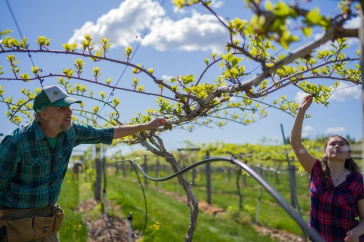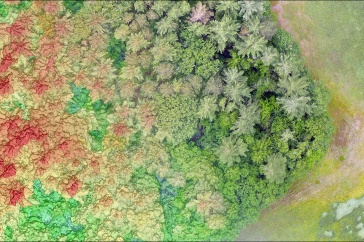
New research from the New Hampshire Agricultural Experiment Station in the UNH College of Life Sciences and Agriculture has found that with the right management, certain varieties grow better here.
Have you ever wondered why there are so many different varieties of grapes, but you can find only red, green, and black grapes at the local grocery store? New Hampshire vineyard managers, backyard enthusiasts, and consumers one day may enjoy the diverse tastes of locally grown seedless table grapes. New research from the New Hampshire Agricultural Experiment Station in the UNH College of Life Sciences and Agriculture has found that with the right management, certain varieties grow better here.
“Seedless table grapes are typically grown in much warmer climates, although several newer varieties released since the 1970s promise increased winter hardiness,” Sideman said. “Seedless table grapes offer potential for existing vineyards that focus primarily on wine grapes to diversify into additional markets. They also may be a new crop to consider for those who do not currently grow grapes. In particular, the crop management requirements and timing could be compatible with other orchard or berry crops.”
Researchers are evaluating eight varieties of seedless table grapes that were planted in May 2015: Canadice, Concord Seedless, Lakemont, Marquis, Mars, Reliance, Thomcord, and Vanessa. In particular, Mars has performed very well, with consistently high yields, high fruit quality, and relatively good disease resistance. The results are particularly relevant to growers in New Hampshire and Northern New England in USDA hardiness zone 5B and warmer, which corresponds approximately to the southern half of New Hampshire, and much of the rest of New England.
The scientists also are evaluating effects of different growing systems, called training systems, and how these systems affect the potential nutritional benefits of table grapes.
This material is based upon work supported by the NH Agricultural Experiment Station, through joint funding of the National Institute of Food and Agriculture, U.S. Department of Agriculture, under award number 1006928, and the state of New Hampshire. This work also was supported by the NH Department of Agriculture, Markets & Food through NH Specialty Crop Block Grant 14-SCBGP-NH-0033. For additional information about this research, visit https://extension.unh.edu/resources/files/Resource006259_Rep8964.pdf.
188体育app_188体育在线-平台官网 the NH AES: Founded in 1887, the NH Agricultural Experiment Station at the UNH College of Life Sciences and Agriculture is UNH’s first research center and an elemental component of New Hampshire's land-grant university heritage and mission. We steward federal and state funding, including support from the USDA National Institute of Food and Agriculture, to provide unbiased and objective research concerning diverse aspects of sustainable agriculture and foods, aquaculture, forest management, and related wildlife, natural resources, and rural community topics. We maintain the Woodman and Kingman agronomy and horticultural research farms, the Macfarlane Research Greenhouses, the Fairchild Dairy Teaching and Research Center, and the Organic Dairy Research Farm. Additional properties also provide forage, forests, and woodlands in direct support to research, teaching, and outreach.
-
Written By:
Lori Tyler Gula, PhD | NH Agricultural Experiment Station | lori.gula@unh.edu | 603-862-1452



















































